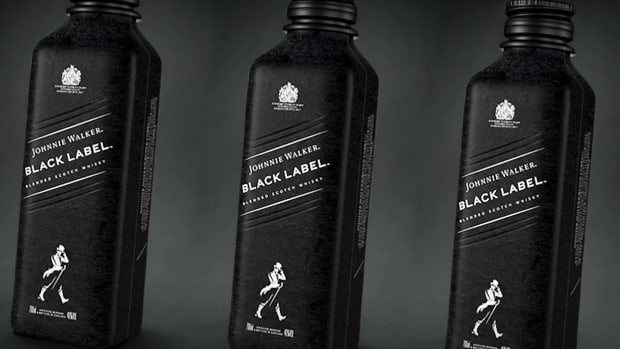From Starbucks (SBUX) getting rid of plastic straws to many a coffee chain offering free refills to those those who bring in their own thermos, how we drink on the go has been the subject of a larger focus on what brands can do to be more sustainable.
At the same time, most of the efforts to reduce waste from drinking has been focused on the disposable containers in which coffee, tea and soft drinks are served.
Even though discarded glass bottles are also a significant contributor to greenhouse gas emissions, alcoholic drinks are rarely given the same laser environmental focus.
Would You Drink Whiskey From A Paper Bottle?
That is slowly starting to change as a number of brands that typically serves their product in glass release play around with paper containers.
Most recently, Heinz (KHC) unveiled the prototype of a paper-based ketchup bottle.
Made in partnership with the British packaging company Pulpex, the bottle is supposed to be sturdy enough to hold naturally-thick ketchup while also being made entirely out of 100%-recyclable wood pulp.
Beloved whiskey label Johnnie Walker has been teasing the idea of a whiskey bottle made 100% PET-free wood pulp for a while now.
After several delays and promises to have it ready for purchase "soon," the company unveiled the bottle made entirely from wood pulp this year but it is not expected to hit shelves until 2023.
Initially, the company had previously promised 2021.
"It feels fitting that we should launch it with Johnnie Walker, a brand that has often led the way in innovation throughout its 200 years existence," Ewan Andrew, chief sustainability officer at Diageo, said in a statement.

Johnnie Walker/TS
As with Heinz, Pulpex was the company that helped create the prototype.
Sustainability Is Profitable (While Promises Make Good PR)
Diageo (DEO) is the parent company of not only Johnnie Walker but also spirits labels such Captain Morgan, Crown Royal and Don Julio.
It had previously committed to phasing out the 183 million gift boxes that are used for its scotch products each year and become a fully zero-waste company by 2030.
"We are constantly striving to push the boundaries within sustainable packaging and this bottle has the potential to be truly ground-breaking," Andrew said.
While social and environmental responsibility can certainly serve as motivating factors, both food and drink brands are feeling tremendous pressure to be more sustainable.
A 2021 study from Deloitte found that 64% of consumers list recycling and reusing as one of their top three concerns while another 64% are actively trying to reduce single-use plastics.
Another report from the Baker Retailing Center at Wharton found that 75% of surveyed consumers value sustainability over brand name when choosing a product.
With different food and drink brands currently jumping over each other to prove how sustainable they are, commitments to sustainability and zero waste can offer a boost of positive PR for a company.
Meanwhile, actual implementation of these promises can get delayed by years or, in cases where they are not met at all, get lost in the fray of more pressing events and other news coverage.
"In many cases, the consumer might really be in a difficult situation to identify and differentiate which companies are the front-runners on climate action and which are not," Frederic Hans, a climate policy analyst at the NewClimate Institute, recently told the Washington Post.







